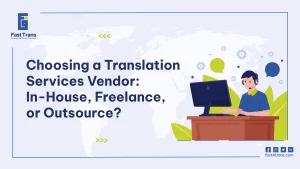We’ve talked previously about the types of translation and mentioned that specialized translation is a wide field that includes financial translation.
In this article, we’ll dive deep into the field of financial translation. Follow along to learn more about what is financial translation, its challenges, types, and tips for improving it.
What is financial translation?
Let’s first get a look at the definition of this field
Financial translation is a specialized field of translation that requires a solid grasp of both source and target text languages in addition to an understanding of financial matters, and the tone of financial documents.
A financial translator could be hired to translate anything from tax reports, stock market analyses, and retirement plans, to bank statements.
You can think of financial translation most needed by international corporations. When companies expand to different countries or partner with companies that speak another language, they must have financial agreements translated to ensure communication with all parties involved.
Importance of financial translation
One question the businesses who are expanding off-border ask is: How to communicate effectively with the needs, laws, regulations and demands of the new market? the answer to this lies in financial translation and localization.
Financial texts like business plans, contracts, purchase orders, bonds, audit reports and so much more are in no way trusted to AI-powered online translation tools like Google Translate, they must be handled by an experienced translator with an eye for detail.
When handled the right way, the translation of financial texts could contribute to better communication between enterprises, increased revenue, and enhanced reputation.
Types of financial translation
The list of documents that a financial translator might be required to handle is overwhelmingly long. Generally, they belong to five types of sectors: accounting, corporate, insurance, real estate, and manufacturing.
Accounting
Invoice translation:
A bill from the seller to the buyer that indicates all information about the purchased product like price and quantity.
Corporate
Annual reports translation:
A financial report that analyzes how a company performed over the year.
Balance sheets translation :
Another type of financial statement that is usually referred to as a snapshot of a company’s financial position at a point in time.
Insurance
Insurance policies translation:
A contract between insurer and policyholder that states what the insurer promises to pay for.
Financial statements translation:
Typically, a formal account of the financial activities of a company or a person.
Compliance documentation translation:
When an organization document reports that prove that it is following necessary compliance requirements and standards.
Real Estate
Income statements translation:
An important financial statement that shows how a company performed financially at a certain time.
Property listings translation:
Listings that could be found online or offline that include properties for sale.
Manufacturing
Expense reports translation:
Covers all financial expenses that a business needs to run, tracking business spending.
Supply chain documents translation:
An umbrella to a variety of documents needs in the long process of production and distribution such as invoices, or insurance certificates.
Other types of financial translation include:
- SEC reports translation
- business plans translation
- cash flow statements translation
- Fiscal reports.. translation
- Bank statements. translation
- Tender documentation. translation
- Foreign exchange translation
- Tax reports translation
- Client meetings translation
- Retirement plans translation
- Employee benefit meetings translation
Challenges of financial translation
Although financial translation as a field is in demand from corporations, making it a good career for translators, it might come with some challenges, let’s look at a few of them:
- Staying up to date with changing rules and regulations, because financial terminology must comply with international standards.
- Contextual challenges: financial translators need to localize and understand the specific context of a given text.
- Small mistakes/Huge repercussions: one of the key challenges of this field is its need for accuracy because one mistake can result in financial or legal consequences.
- Dealing with lots of numbers, symbols, dates, and currencies that need to be localized when translated from one language into another.
- Consistent terminology is expedient: to achieve consistency a financial translator needs the help of multiple tools like translation memories, term bases, and glossaries.
- Tight deadlines in a fast-paced market: financial translators could be flooded with work that needs to be delivered quickly without compromising accuracy, they are one part of a developing machine.
- Constant adaptation to new emerging markets and terminologies, make working in this field a constant progress.
7 Key Tips for Better Financial Translation
With the above being said, financial translation certainly is far from being a dry word-for-word language conversion, it requires being up to date with many market trends, and constant improvement of personal skills.
Here are 7 pro tips each financial translator should attain, and each company should look for when hiring a professional to handle their financial documents.
1- Using Translation tools and software wisely
You must have heard of CAT tools right? if not, we wrote a comprehensive guide to it that could help give you a solid background.
CAT tools are important for specialized translators because it has been proven to increase accuracy, turnaround time, and consistency with the help of their integrated features. It is crucial to be mindful of which tool to use, and how to use it properly to maximize productivity.
They have translation memories that contribute to consistency, and quality assurance tools that scan translation for errors or grammatical mistakes.
2- Understand the financial context
Anyone will tell you that understanding the context is like doing half of the job. Companies could help translators understand the context, saving time for both parties.
This involves fostering open communication between translators and the financial team which could go a long way in clearing ambiguities.
3- Be Up to date with rules and regulations
This builds upon the previous one. One way of understanding the context is to make sure you are up to date with the changing regulations, failing to incorporate recent updates can lead to legal or financial repercussions.
This also involves staying up to date with financial news, and trends in the industry. Subscribing to a handful of useful financial magazines and publications will keep you on track with your surroundings.
4- Prioritize accuracy over speed
It is the job of the financial translator to double, even triple-check the data. This involves checking currency conversion, date formats, percentages, calculations, numeral conversions and other vital data.
Accuracy involves localizations of things like numerical separators. It could be that is a dot (.) in countries like the US, but becomes a comma (,) in Europe.
5- Colloquialisms or Jargon
Well, what about them?
This goes back to knowing who your reader is. It is crucial to stay away from difficult jargon or industry-specific terms when the audience is not familiar with them, and then find a work around them.
6- Confidentiality and Data Safety
The advice goes for corporations as well as individual translators. Financial information could be secured by using encryption tools, avoiding using untrusted online translation tools or investing in a translation management system (TMS) to keep all data in one place.
7- Maintain a Dynamic Glossary
Since the field is by no means static, keeping a polished glossary for terms that you will need is crucial for specialized translators in general and financial ones in particular.
Read more: What is back translation
How Fast Trans helps you with financial translation
In Fast Trans, we have hand-picked a team of professional certified translators who have years of experience in the field. We have worked with not one, or two, but dozens of the largest companies in the Middle East operating in different industries.
We offer financial translation as one out of nearly 20 other translation services, ensuring the satisfaction of our clients.
Are you expanding your business in a new region and need a trusted company to handle your financial documents swiftly and accurately? Fast Trans is here to help.
Your journey with us starts here.










